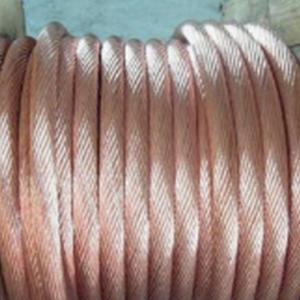As an important part of electrical safety, the role of the grounding system cannot be underestimated. Choosing the appropriate ground wire material is critical to ensuring the reliability and safety of the entire system. Copper wire is widely used in grounding systems due to its excellent electrical conductivity and corrosion resistance. But there are many types of copper wires on the market. How to choose the right copper wire for grounding?

First, the choice of grounding copper wire needs to be determined based on the size and nature of the electrical system. For a home or small office, #6 to #2 AWG (American Wire Gauge) bare copper wire or green insulated copper wire is typically used. Copper wire of this size will meet the grounding requirements of most homes and small buildings.
For larger commercial or industrial electrical systems, thicker copper wire may be required, such as #1, 1/0, 2/0 AWG or larger. This is because larger systems may have higher current demands, and thicker copper wire provides greater current carrying capacity and lower resistance.
When selecting copper wire, you also need to consider the type of grounding copper wire. Common ones on the market include bare copper wire, tinned copper wire and green insulated copper wire. Bare copper wire is favored because of its lower cost, but may become corroded in some environments, affecting grounding effectiveness. Tinned copper wire is coated with a layer of tin, so it has better corrosion resistance than bare copper wire, and is suitable for use in humid or chemically corrosive environments. The green insulated copper wire can provide stable grounding protection in any environment due to its insulation layer protection.
In addition to the specifications and types of copper wires, the method of installing grounding copper wires is also an important factor affecting the grounding effect. Proper installation should ensure that there is a good electrical connection between the copper wire and the ground rod or plate, and that the ground path is as direct as possible, avoiding excessive connections and bends, which can increase ground resistance.
As technology develops, so do the design and material selection of grounding systems. Currently, some new grounding materials, such as Copper-Clad Steel Wire, are becoming new choices in the grounding field because they combine the strength of steel with the conductive properties of copper. While these materials may differ in cost and installation from traditional copper wire, their demonstrated long-term durability and cost-effectiveness in specific applications make them an alternative worth considering.
In summary, selecting the appropriate copper wire for your grounding system is a critical step in ensuring electrical safety. Whether you are a home user or an engineer, you should choose the appropriate specifications and types of copper wires based on the specific application environment and electrical needs, and install them according to the correct method. With the development of materials science, more high-performance grounding materials may appear in the future to meet the ever-increasing electrical safety standards.
 English
English  Español
Español  Português
Português  русский
русский  français
français  日本語
日本語  Deutsch
Deutsch  Tiếng Việt
Tiếng Việt  Italiano
Italiano  Nederlands
Nederlands  ไทย
ไทย  Polski
Polski  한국어
한국어  Svenska
Svenska  magyar
magyar  Malay
Malay  বাংলা
বাংলা  Dansk
Dansk  Suomi
Suomi  हिन्दी
हिन्दी  Pilipino
Pilipino  Türk
Türk  Gaeilge
Gaeilge  عربى
عربى  norsk
norsk  اردو
اردو  čeština
čeština  Ελληνικά
Ελληνικά  Українська
Українська  Javanese
Javanese  فارسی
فارسی  தமிழ்
தமிழ்  తెలుగు
తెలుగు  नेपाली
नेपाली  Burmese
Burmese  ລາວ
ລາວ  Қазақ
Қазақ  Euskal
Euskal  slovenský
slovenský  Македонски
Македонски  Română
Română  Српски
Српски  简体中文
简体中文  Afrikaans
Afrikaans  עִברִית
עִברִית  יידיש
יידיש  Беларус
Беларус  മലയാളം
മലയാളം  Hawaiian
Hawaiian  հայերեն
հայերեն 







